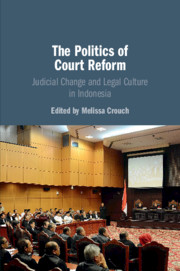Book contents
- The Politics of Court Reform
- The Politics of Court Reform
- Copyright page
- Contents
- Figures
- Tables
- Contributors
- Acknowledgements
- 1 The Judicial Reform Landscape in Indonesia
- Part I Continuity and Change in the General Court System
- Part II Specialised Courts Established under the New Order
- Part III Specialised Courts as Judicial Reform Strategy
- Part IV Courts and Rights
- 12 The Juvenile Courts and Children’s Rights
- 13 The Human Rights Courts
- 14 The Industrial Relations Court
- 15 The Media
- 16 Lev on the Links between Legal Evolution, Political Change and Activism
- Epilogue
- Glossary
- Bibliography
- Index
13 - The Human Rights Courts
Embedding Impunity
from Part IV - Courts and Rights
Published online by Cambridge University Press: 30 August 2019
- The Politics of Court Reform
- The Politics of Court Reform
- Copyright page
- Contents
- Figures
- Tables
- Contributors
- Acknowledgements
- 1 The Judicial Reform Landscape in Indonesia
- Part I Continuity and Change in the General Court System
- Part II Specialised Courts Established under the New Order
- Part III Specialised Courts as Judicial Reform Strategy
- Part IV Courts and Rights
- 12 The Juvenile Courts and Children’s Rights
- 13 The Human Rights Courts
- 14 The Industrial Relations Court
- 15 The Media
- 16 Lev on the Links between Legal Evolution, Political Change and Activism
- Epilogue
- Glossary
- Bibliography
- Index
Summary
This chapter critically examines the development of the Indonesian Human Rights Courts that were established following the fall of authoritarianism. Intended to address past and present cases of gross human rights abuses, the Courts have attracted strong criticism for failing to hold perpetrators accountable. This is widely regarded as a consequence of the influence of powerful political actors resistant towards human rights reform. This chapter seeks to deepen the understanding of the gap between the goals of the Human Rights Courts and their actual performance, through a socio-political analysis of law and legal institutions. Using Daniel S. Lev’s concept of legal culture, this chapter will argue that while the Human Rights Courts represent a shift in procedure, legal values have not changes legal values consistent with human rights principles embedded in law. This means that while human rights have been made part of the legal and judicial system, the Human Rights Courts have been unable to shape understandings of rights in a way that is conducive to human rights reform, instead embedding impunity for the security forces.
- Type
- Chapter
- Information
- The Politics of Court ReformJudicial Change and Legal Culture in Indonesia, pp. 287 - 310Publisher: Cambridge University PressPrint publication year: 2019
- 6
- Cited by

